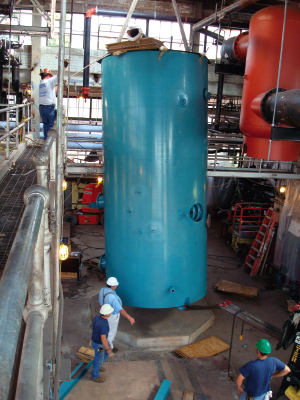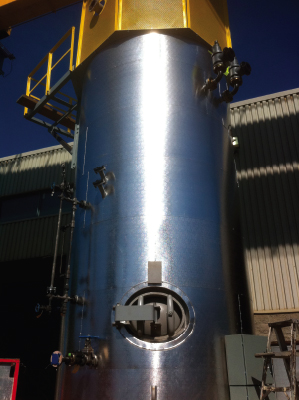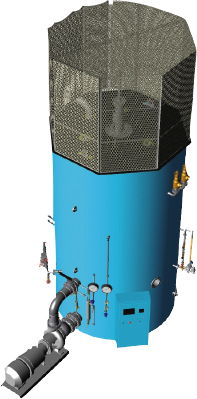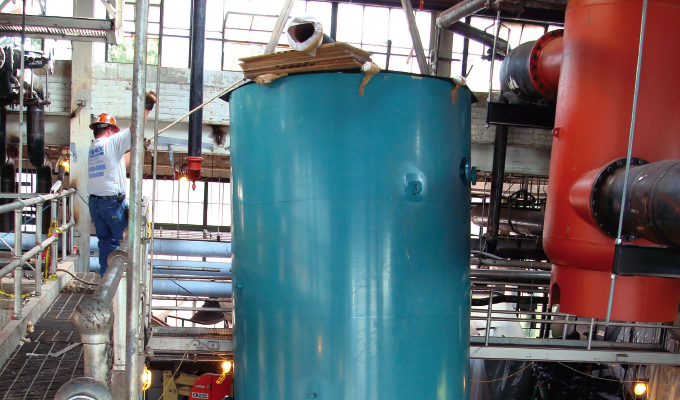Industrial facilities and utilities have long relied on large gas or oil-fired boilers for steam, process heating, or energy production. Today, however, two significant factors are changing the equation: higher gas prices and a need to accomplish a high-priority corporate social responsibility (CSR) initiative—reducing the corporate carbon footprint to combat global warming. The combination is finally spurring many managers and boards to adopt cost-effective, zero emission electric steam and hot water boilers in plants.

DODGING THE SPIKE, AIDING THE ENVIRONMENT
Recently, the price of NYMEX Henry Hub gas surged to almost $6/MMBtu on supply concerns and is expected to stay high into 2022. With the cost of gas spiking, the economic argument for transitioning to electric boilers is growing stronger.
However, economics alone is not the only argument in favor of electric power over gas. With the effects of climate change more apparent, companies are also taking seriously their commitments to practice good corporate citizenship. Many firms are implementing CSR initiatives to limit their environmental impact and fight climate change by reducing their fossil fuel emissions.
By practicing corporate social responsibility as a business model, specifically in terms of being a good environmental steward, companies elevate their brand. In many cases, this can be a factor in motivating environmentally conscious consumers to do more business with them. Practicing ethical behavior can also help to attract and retain employees.
“More companies in the industrial sector are starting to look at where they are burning fossil fuels and considering if there is an economical, more sustainable replacement. For many, utilizing an electric boiler is an easy answer,” says Robert Presser, vice president of Acme Engineering, a manufacturer of industrial and commercial boilers with operations in the United States, Canada, and Europe.
Presser adds, “The move toward using industrial electric boilers is more than just an economic argument today. It is a significant, concrete way to meet corporate CSR commitments that move the company toward becoming carbon neutral in alignment with COP26 UN Climate Change Conference targets. Global finance’s commitment to fund green initiatives from alternative energy to consumption will ease financing this transition.”
According to a recent article in The Economist, at COP26 “Countries committed themselves to further accelerating their decarbonization plans and, specifically, to strengthening their emissions-reduction targets for 2030 by next year. … Rules to create a framework for a global carbon market were approved. … The need to reduce global greenhouse-gas emissions by a whopping 45 percent by 2030 was formally recognized.”

A COST-EFFECTIVE ALTERNATIVE TO FOSSIL FUEL BURNING BOILERS
Natural gas-fired boilers and furnaces emit not only the notorious greenhouse gasses carbon dioxide and methane, but also dangerous nitrogen oxides, carbon monoxide, and nitrous oxide, as well as volatile organic compounds (VOCs), sulfur dioxide, and particulate matter (PM).
Still, many facility engineers opt for familiar gas-fired boilers out of the mistaken belief that electric boilers cannot match the output of the conventional, fossil fuel burning units. Due to considerable advances in electric boiler technology, that is far from the case. Today, such technology can match the capacity of large gas or oil-fired boilers in a much smaller footprint.
ELECTRIC BOILERS UP CLOSE
Electric boilers utilize the conductive and resistive properties of water to carry electric current and generate steam. An AC current flows from an electrode of one phase to ground using the water as a conductor. Since chemicals in the water provide conductivity, the current flow generates heat directly in the water itself. The more current (amps) that flows, the more heat (BTUs) is generated, and the more steam produced. Crucially, almost 100 percent of the electrical energy is converted into heat with no stack or heat transfer losses.
With this design, for instance, the CEJS High Voltage Electrode Steam Boiler by Acme produces maximum amounts of steam in minimal floor space, with boiler capacity from 6MW to 52MW. The boiler operates at existing distribution voltages, 4.16 to 25 KV with up to 99.9 percent efficiency, and can produce up to 170,000 pounds of steam per hour. With pressure ratings from 105 psig to 500 psig, the boilers are designed to ASME Section 1, and are certified, registered pressure vessels at the location of the boiler.
“A generation or two of facility engineers grew up with oil and gas-fired boilers almost exclusively,” says Presser. “As a result of preconceived notions, most view electric boilers as small underpowered units, like a hot water heater. So, we frequently explain to engineers that there is electric boiler technology that can replace large gas or oil-fired boilers in a very small footprint.”
He notes that high-capacity electric boilers are well suited to supply auxiliary power virtually on demand. Auxiliary boilers also are used to supply turbines with steam when high output is required quickly, and to heat process water.
BENEFITS ACROSS THE BOARD
Furthermore, industrial electric boilers have several advantages compared to oil or gas-fired boilers, including superior safety, ease of installation, faster start-up and shut down time, and quiet operation. Electric boilers do not have a high minimum operating level to make them immediately available.
“Electric boilers do not need an operator because if anything goes wrong, the breaker trips, preventing further escalation of the issue,” says Presser. “With gas burning boilers, however, any gas leak can increase the risk of an explosion. So, gas units must usually be continually monitored or periodically inspected.” He notes that state and municipal safety guidelines vary depending on boiler type and the expected frequency of inspection.
With electric boilers, the energy input as well as adjustment is also precise and virtually immediate. In contrast, increasing or decreasing the temperature in a gas fired boiler is a slower process because it takes time for the heat in the boiler to rise or dissipate before reaching the targeted output.
Electric units are also exceptionally quiet compared to fuel fired boilers. “Unlike gas-powered burners that throttle like turbine engines almost continually, electric boilers keep operational noise levels down,” says Presser. “The loudest noise you are going to hear from an electric boiler is the circulating pump.”

MYRIAD APPLICATIONS
Besides industrial applications, electric boiler technology is also used for residential and commercial district heating, which is increasing in demand, particularly within urban centers. With district heating, distributed heat is generated in a central location through an insulated pipe system, and utilized for high-efficiency, low-pollution, space, and water heating.
For central heating applications, electric boiler technology quietly supplies ample power for its compact size. This approach is currently being considered to install several 50MW steam boilers in the center of Manhattan, replacing gas-fired boilers to provide centralized steam to a number of buildings.
“There is increasing interest in the United States for district heating. We have spoken with utilities with massive boiler plants still feeding steam lines throughout major city cores like NYC. Many want to curb emissions associated with that in urban centers,” says Presser.
He points out that electric boilers can replace a battery of huge gas fired boilers. “Today, with a number of 52 MW boilers we can produce 300 MW of steam power in the city core with no emissions,” he says.
THE ALTERNATIVE FOR THE FUTURE
As industrial facilities and utilities consider alternatives to boilers burning more costly gas, one of the most cost-effective options will increasingly be zero emission, electric steam and hot water boilers.
The sustainable choice not only helps companies fulfill their environmentally friendly CSR initiatives with clean electric power, but also can help to position their brand as one that is serious about fighting climate change and honoring their public commitments.
FOR MORE INFORMATION
Acme Engineering Products offers a wide range of standard product boilers but distinguishes itself by providing custom solutions with ease and minimal additional cost. Acme has always produced packaged solutions that include controls and instrumentation. This required the development expertise in pressure vessel design, on which its boilers’ technology is based, to complement the electrical engineering for its heating and control systems. For more information, contact Robert Presser at Acme Engineering via email at rpresser@acmeprod.com, calling 518.236.5659, or visit www.acmeprod.com.
MODERN PUMPING TODAY, February 2022
Did you enjoy this article?
Subscribe to the FREE Digital Edition of Modern Pumping Today Magazine!



